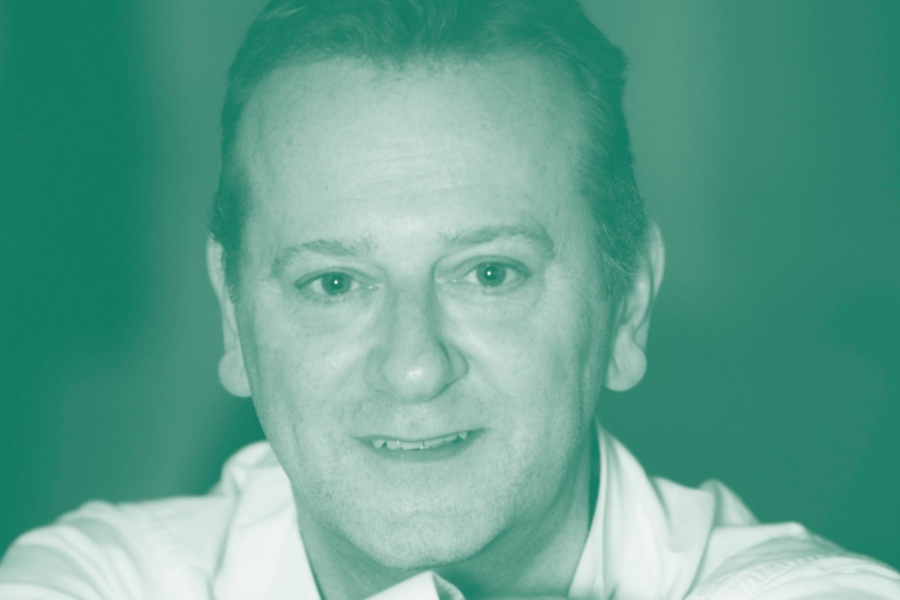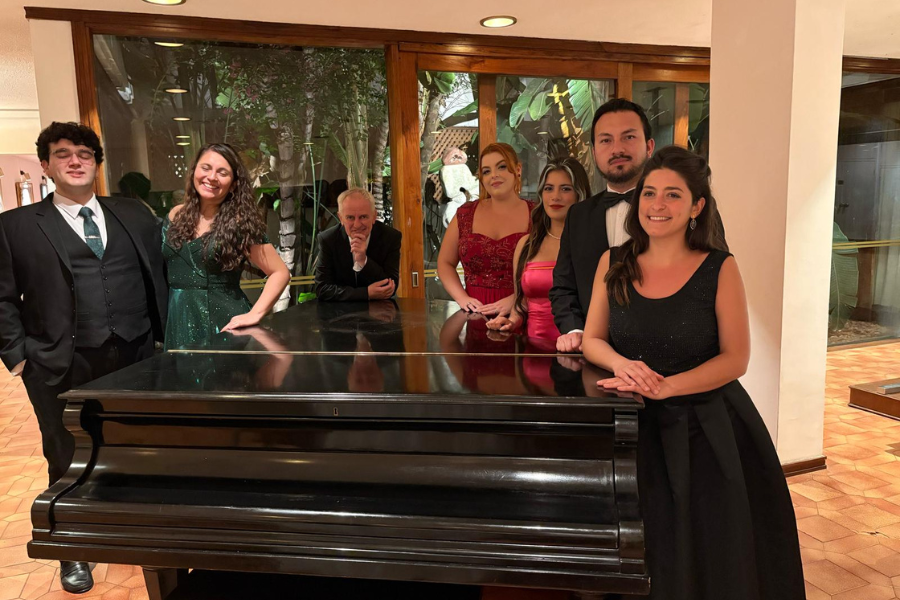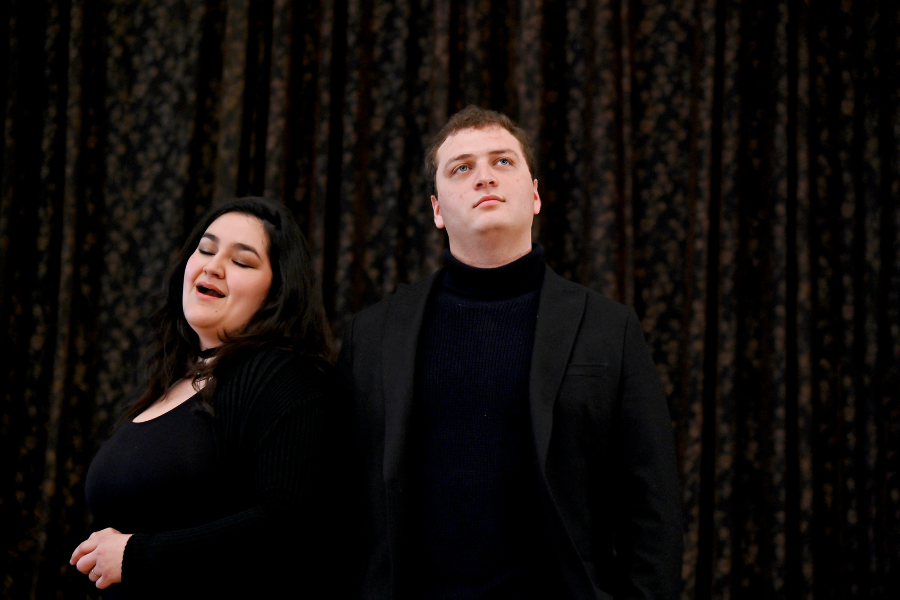Innovation and originality, qualities of Latin Americans | David Gowland

In 2017, thanks to a collaboration agreement between Jette Parker Young Artists Programme and Ópera Latinaomérica [correction], David Gowland –artistic director the Royal Opera House’s programme– traveled to Argentina, Brazil, Chile and Colombia to meet the new Latin American lyrical talents. This February, David Gowland returns to the region for a new version of Opera Workshop, this time in Uruguay, organized by InterArte. For Gowland, returning to the continent means rediscovering the “innovative and original freedom of expression” that, according to him, young Latin American singers have, who have also “become more resilient people.”
The Uruguayan organization InterArte, with the support of the SODRE National Auditorium and the Royal Opera House (ROH) in London, will hold the Opera Workshop 2022 between February 14 and 27, an open call for face-to-face courses for Latin American singers and pianists. The workshops will be led by David Gowland, artistic director of the ROH’s Jette Parker Young Artists Programme (JPYAP), a professional who in 2017 visited Argentina, Brazil, Chile and Colombia together with stage director Andre Heller-Lopes, to give master classes to local artists.
That experience in 2017, which was the result of the collaboration between JPYAP and OLA [correction], was –in the words of Gowland– a “mission of exploration, discovery, questions, search for solutions and facilitating support for potential artists on their way to the international circuit”. A few weeks before a new Opera Workshop in Montevideo, David Gowland evaluates JPYAP’s strategy in Latin America, comments on the main challenges young singers face when being selected to participate in the ROH program and explains why, then of the pandemic, new talents have become more resilient and self-taught.
Why did the Jette Parker Young Artists Programme (JPYAP) decide to observe the Latin American artists scene? What are the goals of the strategy? Promotion? New talent discovery? Professional training? All of them?
London, ROH and JPYAP strive to represent and embrace all international cultures and ethnicities. Historically many international artists were Latin-American. However, as a regular jury member on international competitions, also over the 20 years of our Programme and in the UK conservatoires I had noticed a fall in numbers. Why? Lack of access or opportunities? Education? Therefore, my visit to Latin America in 2017 in conjunction with alumnus Andre Heller-Lopes was a mission of exploration, discovery, questions, solutions, facilitation to support potential artists on their journey to the international circuit.
Why do the workshops in Latin America consist of music and staging work and not only auditions?
For any audition, competition, application, a singer is required to submit recordings. If selected, it can be assumed that he/she/they have been acknowledged by the selection panel in terms of vocal potential. In an opera, if a character is lucky enough to have an aria, this will be perhaps five minutes of a three-hour event. Therefore, especially given the increasing demands of the profession, productions and audience expectation in a fiercely competitive industry, the focus of work is musical, stylistic and linguistic preparation, physical and mental dramatic skills of communication, an ability to sustain a character’s credibility and interact with colleagues on every level.
What is the level of preparation that young Latin American artists who attend the previous workshops –in Argentina, Brazil, Chile and Colombia– have? What advantages and improvement opportunities do you see in them in terms of their background?
As I only spent around four days in each of these countries, I didn’t have enough time to explore general levels of preparation, my only guide being my work with them individually on how they presented themselves, how I could advise them appropriately, relevantly, without confusion or compromising that which they had already accomplished.
What I can say is that I found each singer I encountered in Latin-America had a refreshing freedom of expression which in my opinion is as essential as a starting point as having a good natural voice. In answer to your question, I would say this is an advantage. Specific musical and linguistic preparation, stagecraft, are technical skills which can be improved with appropriate guidance.
I would suggest that improvement opportunities might include group scenes, interaction, not even as performances but as a process of exploration and exchange. Opera is a team activity. These interactions are so very beneficial to all in enhancing personal artistic identity.
Why did you decide to do the 2022 Opera Workshop in Uruguay? What are your expectations?
I encountered Uruguayan tenor Andrés Presno in Buenos Aires during my 2017 trip. He was only 22, showed amazing potential. Deserving of appropriate guidance, I facilitated a scholarship at Guildhall School of Music and Drama under the tutelage of international soprano Yvonne Kenny. His incredible commitment and respect were such that after only three months he was unanimously selected to join JPYAP. Due to the global pandemic, he spent much of his tenure in Uruguay, where he was proactive in supporting, inspiring and encouraging aspiring Uruguayan talent, arranging Zoom Masterclasses with me and others, sharing that which he had experienced.
Therefore, JPYAP was delighted to support his initiative of the Opera Workshop.
My initial 2017 trip to Latin-America included Brazil, Argentina, Chile and Colombia with singers travelling to whichever was most convenient. Depending on my findings we had already anticipated another visit to other locations. I am delighted therefore that the Opera Workshop also includes singers from Venezuela, Peru, etc.
Recently, Latin American artists like Yaritza Véliz, Pablo Bemsch, Michel de Souza and Germán Alcántara, among others, have participated in the JPYAP. Do you think that the increase of Latin American students is due to the strategy the programme has implemented in the continent?
Yes, I do. although I cannot claim that JPYAP had any influence prior to them joining the Programme.
I met Yaritza Véliz on the same 2017 trip as Andrés Presno when I also had the opportunity to meet the Ibanez-Atkinson Foundation. We continue to enjoy a close collaboration, sharing ideas and suggestions.
The other singers you cite came from different routes: Pablo applied independently; Michel trained in UK, so I already knew him; Germán had studied in Paris then the Reina Sofia institution in Madrid. I had already been invited there as a guest coach by international tenor and teacher Ryland Davies, with whom I’d collaborated many times on the international circuit. Their singers are mostly Spanish speakers, many from Latin-America. Germán had already graduated when he applied for the Programme.
However, we are grateful to them all once they join the Programme in inspiring local young artists as role models and ambassadors of JPYAP, supporting any initiatives they may suggest as an organisation.
This also extends to JPYAP alumni stage directors Andre Heller-Lopes (former Artistic Director, Teatro Municipal, Rio de Janeiro) and Argentinian José Darío Innella.
How is the experience of working with young artists on the Jette Parker Programme? What are the most common challenges that surface in the auditions, training processes and study programmes?
For all international young artists joining the Programme, initial challenges are adjusting to living in London, homesickness, being thrown in to share the stage in a small role with the greatest international stars, working with the greatest international conductors and directors. There is also the challenge of language as rehearsals will generally be conducted in English/Italian etc depending on the common language in the room.
ROH music staff, assistant, stage management, chorus and all departments across the organisation provide as much support as possible. The level of preparation is daunting but JPYAP nurtures 100%.
Often JPYAs are performing, understudying and preparing multiple roles in three different productions simultaneously plus preparing recitals and participating in high-profile events. Being prepared to the level of ROH expectation is a priority. This requires incredible resilience and organisation which again JPYAP monitors closely in preparation to meet deadlines, forward-thinking, being aware of vocal, mental and physical well-being.
Once a young artist gets selected to participate on the JPYAP, he or she has the experience to work with world-class directors, musicians, artists, and singers at the ROH. Can you describe that training process? What are its benefits?
Much of this was covered in my previous response. Scrupulous preparation is essential. If it is a new production, then there is time to build character. However, with revivals eg Traviata, Carmen etc there is limited rehearsal time and the focus will be on the main protagonists. Therefore, the smaller roles, often cast by JPYAs must be able to take personal responsibility in creating a character, respond and be flexible to exchange with these stars immediately.
Hence the necessity for encouraging confidence in stagecraft skills as soon as possible.
This is vital training for singers who go on to a fest career in Germany where there are no rehearsals for revivals, perhaps one run-through, also for an artist who has to jump-in at limited notice elsewhere without knowledge of the production, or an understudy who must step up to assuming the role and confidently give colleagues what they expect whilst managing to exist in their own right.
Does having a cultural, linguistic, and educational diverse body of students at the JPYAP play a role in the development of young professionals? Why?
Absolutely! All artists arrive with their own cultural and educational experience. The beauty of the Programme is that it encourages an exchange, a mutual respect and appreciation of differences. Opera is generally a Western-European medium yet those who are engaged come from elsewhere. The common ground is therefore that they are working together in a mutually alien environment of expression where all are equal and perhaps insecure. An example might be a Puccini love duet between an Argentinian tenor and a Chinese soprano: they are performing in Italian to a largely English audience at ROH. Without compromising their own integrity or cultural background how can they work together convincingly? How do they connect physically whilst maintaining appropriate respect? These are the challenges. Nevertheless, with the right support which we hopefully provide all will feel respected, comfortable and the results will be beautiful. Our politicians could learn much from this process!
Are there any Latin American artists that have recently caught your attention?
Yes indeed. Obviously due to the global pandemic I have had limited live access for the past two years but via Zoom there are several whom I look forward to meeting in person, for example Vanessa Rojas from Chile, currently supported by the Ibanez-Atkinson Foundation.
What advice would you give a young artist in the current state of opera?
The global pandemic has challenged us all. However, I feel that many singers have developed vocally as they have had time to rest, reflect. Many have taken advantage of enforced timeout to prepare roles: background research, reading through the original source material (eg La Dame aux camélias if learning roles in La Traviata) also exploring correspondence between composer and librettist. I am also encouraged that many have taken online language classes.
Auditions, classes online have challenged artists to become objective in how they present themselves. The camera does not lie. Therefore, specific intention, engagement through the eyes, also self-presentation when introducing themselves are skills they have had to learn on their own. Rather than rely on external or physical gestures of expression these limitations have encouraged singers to express through their voice and eyes leading to a more intense connection.
Even those fortunate to have been engaged in live performance have probably had to learn how to rehearse with masks, how to engage with colleagues whilst respecting distance.
Therefore, my advice would be to continue all the above as I am confident that the pandemic has led to young singers becoming more resilient, looking for other means of self-development and expression to which the industry has responded. Often when we are faced with restrictions as artists or human beings, we become more inventive, these limitations proving a catalyst for us to step up to the next level.
Capitalise therefore on what makes you unique, different and special without comparing yourself to others. Now is your opportunity.
Correction: A previous version of this article said that David Gowland’s trip to Latin America in 2017 was articulated by Ópera Latinoamérica; the correct information is that the visit was made thanks to a collaboration agreement between the Jette Parker Young Artists Programme and Ópera Latinoamérica. We apologize for any inconvenience the error may have caused (April 8, 2022).





